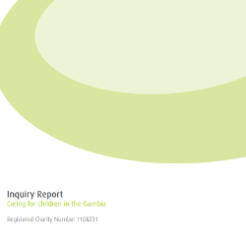A company connected to a charity ceased trading four days after the Charity Commission opened a statutory inquiry into the organisations, according to the report published today.
The inquiry report said that it was difficult to “draw a distinction” between the activities of Caring for children in the Gambia (‘the charity’), governed by a declaration of trust dated 28 December 2004, and Caring for Children in the Gambia Limited (‘the company’) which was incorporated on 12 August 2008.
The charity’s purpose was to “advance the education of children in the Gambia, West Africa” and was registered with the Charity Commission on 22 February 2005. The company’s purposes were to “promote and advance education of children and alleviation of poverty within local communities in the Gambia”.
The Commission received an application in November 2011 to register the company as a charity which indicated that the trustees intended to replace the old charity with the incorporated company.
The application was rejected by the regulator, which found that the objectives of the company were not exclusively charitable and that insufficient evidence was provided to demonstrate that the company met the definition of a charity under the Charities Act 2011. Periodic attempts were made by the company to register as a charity, with each subsequent attempt being rejected on the same grounds by the Commission.
In April 2013, the charity was removed from the list of registered charities and in October of that year a regulatory compliance case was opened into the charity by the commission. After investigating the charity’s books and meeting with one of its trustees, the regulator updated its investigation to an inquiry on 25 February 2014.
The inquiry found evidence of “poor financial controls and record keeping” at the charity and said that the trustees were able to provide only “limited evidence of charitable activity”.
Trustees of Caring for children in Gambia charity were notified of the inquiry on 19 March 2014, the company arm of the organisation ceased trading a few days later on the 23 March. The regulator subsequently found that the charity had also ceased to operate.
In its report, the Commission concluded that “risks of misuse or loss of charity funds through a lack of separation between the company and the charity have been addressed as both the charity and the company have ceased to operate”.
Carl Mehta, head of investigations and enforcement Operations at the Charity Commission, said: "Charities often work closely to good effect with other organisations, but they have to keep their affairs separate from them, especially when they are carrying out activities which are not charitable.
"Otherwise they risk making the charity vulnerable to abuse, and being in breach of their legal duties as charity trustees.”









